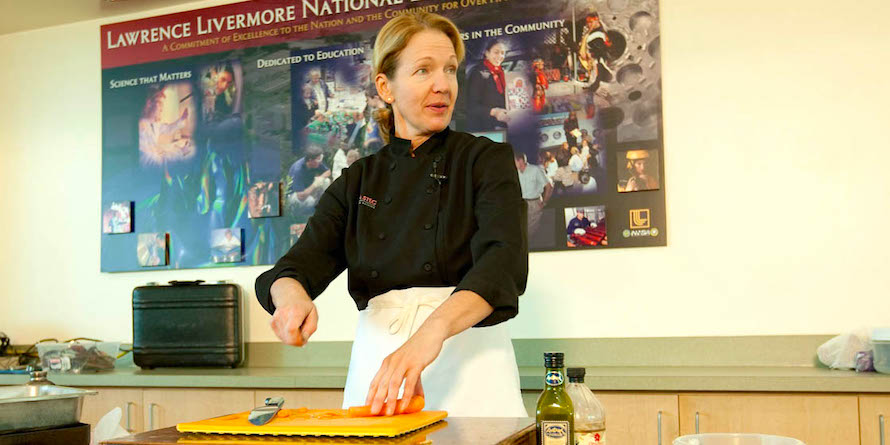Summer Cooking With Chef Laura
Our "Summer Fresh With Chef Laura" series is going strong all summer long! Our first event, Latin American-inspired Vegan Eats had Chef Laura Stec showing us how to adapt Latin American cooking techniques in creating exciting, plant-forward cuisine. You can enjoy the recording of that event here, opens a new window. We have two more exciting experiences with Chef Laura coming up that you can register for:
Crafty Cocktails and Mocktails
Wednesday, June 23 at 5:30 PM
Take a break with a tasty libation! Whether you include alcohol or not, increasing the complexity of taste in a drink isn't as difficult as you may think. Chef Laura will show us how to craft mature drinks everyone can enjoy.
A Guide to Garden Grillin’
Wednesday, July 28 at 5:30 PM
Grilling is a beloved summer pastime, and this time we’ll feature veggies and fruits as the main dish and meat as the garnish! Chef Laura will show us how to perfectly grill a watermelon and avoid burning those sensitive zucchini slices.
Meet the Chef: Interview With Laura Stec
Laura Stec is a chef, educator, and author specializing in events and products for healthy people and the planet. Her work has been featured in NPR, Martha Stewart, the Wall Street Journal, and Scientific American. We sent some questions to Chef Laura to learn more about her and her life in the world of cuisine.
You discuss vegan Latin American cooking and grilling with veggies in this series. If there was only one takeaway tip you could impart to people above all others about making vegetables delicious, what would it be?
Vegetables have secrets! What is it? They are sweet! Think about an onion. Raw, it doesn’t taste sweet, but sauté and what happens? Onions caramelize and become sweet - due to the carbohydrates in the onion browning and enhancing when they reach 330 F (166-ish C), or higher. All vegetables are made of carbohydrates, so all vegetables can caramelize if they reach that magical temperature.
The upcoming Cocktails and Mocktails program is coming up on Wednesday, June 23 at 5:30 PM. Let's say we have a hypothetical person who doesn't like drinking alcohol and hasn't really explored the world of cocktails. Why do you think they might still want to come to this event?
We will feature drinks that can be adapted to fit your preferences. Add alcohol or not. Mix and match techniques and ingredients to make a mocktail for children and those who don’t want alcohol or certain tastes, then add a little something extra or adjust into a cocktail for those who do.
You wrote the book Cool Cuisine, which explores the connection between food and climate change. How has the process of writing and researching for this book affected the way you approach cooking being a professional chef?
I was inspired by the food/environment connection long before the book came out. My eating habits have been in line with the book since college years. The biggest change in my relationship to food has been the interest in reducing food waste.
What is your favorite cocktail, and what's a key element of making that cocktail work?
I love a Dirty Martini, which mixes gin with a high-quality olive juice, garnished with 2 high-quality olives. Not all olive juice is the same. Spend a little more for better results. A brand I have been using lately is Dirty Sue.
Can you tell us a bit about the process of developing and testing new recipes? Are there easy ways for people cooking at home to try new dishes/techniques without ruining or wasting food?
I like updating recipes of my past with current eating and health trends. If you are trying new things, consider cutting the recipe in half to avoid excess waste.
What are your top three international cities for cuisine?
Singapore, Naples, Italy and Penang, China
It seems like there are so many techniques one can use to pick fresh produce; it can be overwhelming! What's a rule of thumb to remember when we're browsing at the farmer's market?
Walk down market aisles quietly and be aware. See what produce “jumps out at you” with fresh, high-vibe energy. What screams “Eat me?” That’s what you should buy. Don’t start with recipes, and find foods to fit. Look for vibrant produce and then plan a recipe to go along with [it].
What started you on the journey to becoming a chef? Was it something you always wanted to do?
When I was young my parents used to do a lot of international travel and bring home food and souvenirs from where they visited. I would put on country-themed dinner parties, decorating the kitchen with the trinkets and incorporating the foods into a meal. I’d say to myself, “If I went into the dinner party business, I’d make a million.” Fast forward 40 years and guess what? I did…and I did! A big change came in my eating when I became a vegetarian at 18 years old. Then I went on a Peace Walk in my mid-20’s which drew me away from my college studies and chosen profession, into the world of macrobiotics. My first cooking teacher was a macrobiotic instructor. This discipline sent me off into a whole new world of what’s possible in cooking. In 1988, I started a community group, EcoEaters, and found my heart-song in learning about and promoting the connection between food and the environment. I built my career around those ideals.
What are your top five desert island herbs/spices?
Salt, pepper, cumin, garlic, and a good smoked paprika
You knew we had to ask this eventually. What are you reading right now, cooking or otherwise?
Reading: The Code Breaker by Walter Isaacson and Table With a View (the history and recipes of Nick’s Cove) by Dena Grunt



Add a comment to: 10 Questions With Chef Laura